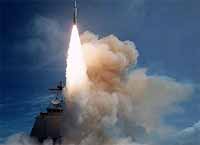Russia prepares to revise military doctrine in response to USA's missile defense plans
Russia's presidential Security Council said Monday it was developing a new national military doctrine that will take into account the growing role of military force in global politics.

The statement appeared to reflect increasing tensions in Russia's relations with the United States, strained over Moscow's harsh criticism of U.S. missile defense plans, disagreements over global crises and U.S. concerns about the Kremlin's democracy record.
While it did not mention the United States, the statement referred to the strengthening of NATO as one of the global policy factors that explain the need for Russia to revise its military doctrine. President Vladimir Putin last month accused Washington of the unrestrained use of force worldwide.
Geopolitical changes and Russia's economic development since the approval in 2000 of the current military doctrine call for a new, revised document, the council said in the statement, which was released to the news media.
"An analysis of the international situation shows that military force has become an increasingly important factor in the policy of leading nations," it said. "Leading powers are paying increasing attention to the modernization of their military forces and the improvement of their armaments. Means of modern warfare are being actively implemented, modes of using force are being reviewed, the configuration of the military presence is being changed and military alliances, particularly NATO, are being strengthened."
Putin has harshly criticized U.S. plans to deploy missile defense components in Poland and the Czech Republic, saying that he does not trust American claims they would be aimed to counter the Iranian missile threat, the AP said.
In angry comments at a conference in Munich last month, Putin said the United States "has overstepped its national borders in every way" and that "the almost uncontained ... use of force in international relations" was prompting countries opposed to Washington to seek to build up nuclear arsenals.
"Armed forces are still being used as the most important instrument for achieving political and economic goals," the presidential Security Council said Monday.
In comments released last month, Gen. Yuri Baluyevsky, chief of the Russian military's General Staff, said the expansion of U.S. economic, political and military presence in Russia's traditional zones of influence has evolved into the top national security threat. Baluyevsky said Russia now faces even greater military threats than during the Cold War and that the nation needs a new military doctrine.
The council said the military modernization efforts depend on the nation's economic development - an apparent reference to Russia's oil-driven economic growth that allowed the Kremlin to bolster military spending in recent years.
Last month, the government unveiled an ambitious weapons modernization program for 2007-2015 worth about 5 trillion rubles (US$190 billion or EUR 144 billion).
Subscribe to Pravda.Ru Telegram channel, Facebook, RSS!


